About Child Nutrition Report 2024:
- It was released by UNICEF.
- This global report examines the status, trends, inequities, and drivers of child food poverty in early childhood, including the impact of global and local food and nutrition crises.
- The report focuses on low- and middle-income countries, where most children living in child food poverty reside, and on the implications of child food poverty for undernutrition and poor development.
- UNICEF defines child food poverty as children’s inability to access and consume a nutritious and diverse diet in early childhood (i.e., the first five years of life).
- Highlights of the 2024 Report:
- One in four children underage 5 around the world (some 27% of children under age 5—or 181 million) is experiencing severe food poverty and is vulnerable to life-threatening malnutrition.
- Over two-thirds of the181 million young children living in severe food poverty live in South Asia and sub-Saharan Africa, with 20 countries accounting for 65% of the children living in severe food poverty.
- These countries are Afghanistan, Bangladesh, China, Côte d’Ivoire, the Democratic Republic of the Congo, Egypt, Ethiopia, Ghana, India, Indonesia, Myanmar, Niger, Nigeria, Pakistan, the Philippines, Somalia, South Africa, Uganda, the United Republic of Tanzania, and Yemen.
- The report also found that children in both poor and non-poor households face severe food poverty.
- About half (97 million) of the children in severe food poverty live in middle- and upper-income households.
Q1: What is UNICEF?
The United Nations Children’s Fund (UNICEF), originally known as the United Nations International Children’s Emergency Fund, was created by the United Nations General Assembly on December 11, 1946, to provide emergency food and healthcare to children and mothers in countries that had been devastated by World War II. In 1950, UNICEF’s mandate was extended to address the long-term needs of children and women in developing countries everywhere. In 1953, it became a permanent part of the UN System.UNICEF works in over 190 countries and territories and in the world’s toughest places to reach the children and young people in greatest need. UNICEF supports immunization programs for childhood diseases and programs to prevent the spread of HIV/AIDS; it also provides funding for health services, educational facilities, and other welfare services.
Source: UNICEF: 1 in 4 young children lives in severe food poverty
Last updated on June, 2025
→ UPSC Notification 2025 was released on 22nd January 2025.
→ UPSC Prelims Result 2025 is out now for the CSE held on 25 May 2025.
→ UPSC Prelims Question Paper 2025 and Unofficial Prelims Answer Key 2025 are available now.
→ UPSC Calendar 2026 is released on 15th May, 2025.
→ The UPSC Vacancy 2025 were released 1129, out of which 979 were for UPSC CSE and remaining 150 are for UPSC IFoS.
→ UPSC Mains 2025 will be conducted on 22nd August 2025.
→ UPSC Prelims 2026 will be conducted on 24th May, 2026 & UPSC Mains 2026 will be conducted on 21st August 2026.
→ The UPSC Selection Process is of 3 stages-Prelims, Mains and Interview.
→ UPSC Result 2024 is released with latest UPSC Marksheet 2024. Check Now!
→ UPSC Toppers List 2024 is released now. Shakti Dubey is UPSC AIR 1 2024 Topper.
→ Also check Best IAS Coaching in Delhi
























